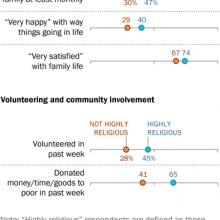Pew Research
A new report from Pew Research Center found that while most Americans think religion has a positive influence on American life, few are willing to have discussions about religious differences.
The report revealed that a majority of American adults (80 percent) would say that “religion’s role in American life is shrinking,” which Pew reported as the highest in the survey’s history. Majorities in each religious group and the religiously unaffiliated say religion is losing influence.
On Sept. 13, Pew Research Center released four hypothetical scenarios that model what the religious landscape of the United States might look like if current demographic trends continue. The four models projected that the U.S. population who identify as Christian would decrease from 64 percent in 2020 to between 35-54 in 2070.
Congregants who’ve heard the sermons — often accompanied by workshops and step-by-step guides — say they are verbal permission slips to discuss a topic few want to talk about. Slightly more than a third of the general public — 37 percent — say they have given a great deal of, or some thought, to their end-of-life wishes, according to Pew Research.
A Conversation Project survey found that while 90 percent of people say it’s important to talk to loved ones about those wishes, only 27 percent have actually done that.

Image via Pew Research Center / RNS
Look around. Three in 10 people you see claim they are pretty satisfied with life, happy, healthy, and moral, too. They’re the “highly religious,” 30 percent of U.S. adults who say they pray daily and attend church at least once a week.

Image via Pew Research Center
Republicans and Democrats divide sharply over views on Islam, Muslims, and how a U.S. president should label violent extremists. But Americans overall agree there’s a “a lot” of discrimination against Muslims living in the United States — and it’s rising — a new Pew Research survey finds.
Hand-wringing among religious folks has never been in short supply, but the doomdayers really had their day a couple of weeks ago, when the Pew Research Center confirmed what conventional wisdom has known now for decades.
We are in an age of post-Christendom — or, American adherents of Christianity continue to decline at a massive rate.
This is a case of statistics catching up with reality. For decades churches have been closing, Sunday Schools have been shrinking, and confirmation classes have been getting smaller. Especially among Catholics and mainline Protestants, the sky has been falling for many years. The right blames gay rights and liberal theology; the left blames hate speech and an overly doctrinal attitude.
The rising number of people choosing “nothing in particular,“ a subset of the "unaffiliated” label, has raised hackles across the theo-political spectrum, from some fundamentalist evangelicals decrying the de-Christianizing of the nation to more mainline Protestant handwringing over the loss of current and future members from already-struggling denominations.
The problem with this range of views (as far as I’ve read) is that, while certainly broad, it’s pretty shallow. There’s nuance to the “nones.” I can say this with confidence as someone who has drifted across the borders of that category once or twice or every other day. While there are certainly those in the group who don’t care about religion, there are also those with complicated feelings. These are people who still see their lives, maybe all life around them, as uniquely religious. Many have even done the work to interpret such complicated feelings, which is no small task.
According to a new study from the Pew Research Center, there are markedly fewer Christians and more “nones” — those who identify of no faith at all — in the U.S. than just seven years ago.
In the wake of this news, many critics have lost themselves in the question of who’s winning. But this isn’t a crisis. We don’t need to defend ourselves. We don’t need to obsess over whose team is in the lead.
But we also can’t just shrug our shoulders. If we have any faith that Christianity has value in the public sphere, we should be reasonably concerned when people begin to see little importance in Christian identity.
1. BB King, Blues Legend, Dead at 89
"The crowds treat me like my last name. When I go onstage people usually stand up, I never ask them to, but they do. They stand up and they don't know how much I appreciate it." — BB King, in a 2013 Rolling Stone interview.
2. The ‘Gang of Girls’ Risks Their Lives to Report from Inside a War Zone
Three of its editors have been killed, eight reporters detained and tortured, and 12 have fled the country. “In the ensuing void of order and information, Enab Baladi has become one of the most prominent independent publications of the war. That it's largely female-staffed is extraordinary. Women are barely represented in the government or in opposition groups—and certainly not in the Islamist gangs that control large swaths of the country. Yet the female editors and reporters have driven deeper coverage of how war affects civilians, families, and day-to-day life for millions of Syrians.”
3. WATCH: Divestment 101: What Do People Mean When They Say Divest?
To learn more, go to sojo.net/divest.
What We Mean When We Say DIVESTWhat do we mean when we say DIVEST?
Posted by Sojourners on Wednesday, May 13, 2015
4. There Are No Urban Design Courses on Race and Justice, So We Made Our Own Syllabus
“Instruction at Harvard’s Graduate School of Design is based in the work of architects whose worldviews don’t give heavy weight to social problems.” In that vein, here is a suggested reading list for urban designers to begin problem-solving and creating solutions for real-world environments.
5. Congrats! You Have an All-Male Panel!
The public shaming tumblr calls out events and conferences that feature all-male experts. A humorous, if not altogether depressing, screen scroll.
The recently released Pew Research Center Report has revealed that Christianity within the United States is on the decline. Christians are freaking out and the fear mongering has begun — many seeing it as an apocalyptic sign of the moral downfall of our secular society coinciding with a theological weakening caused by “liberalism.”
Everyone seems to have an explanation of the data, and among Christians, the infighting has already begun, with most denominations rationalizing their growth, decline, or stagnancy by offering the same explanation: We’re theologically sound and remaining faithful to God while everyone else is getting it wrong.
What Christians must understand — and accept — about these statistics is that religious data about a country doesn’t accurately reflect its corporate actions pertaining to following Christ.
A new report on the “Shifting Religious Identity of Latinos” reads very much like a biography of Fernando Alcantar.
But once he moved to California after high school, his faith journey diverged — and derailed. Today, Alcantar, 36 calls himself a humanist.
The Pew survey report released Wednesday is subtitled: “Nearly One in Four Latinos are former Catholics.” And Alcantar is one of them.
Americans’ attitudes toward the lives and choices of gays and lesbians have changed radically since Massachusetts first legalized same — sex marriage a decade ago.
A new survey finds a significant shift toward tolerance across every religious, political, and age group and every region of the country, said Robert P. Jones, CEO of the Public Religion Research Institute. PRRI’s survey, released Wednesday, reveals the ramifications of these changes in family, church, and community life.
“Only the issue of marijuana looks anything like this in terms of rapid movement in favorability,” Jones said. “But with that one exception, it’s unusual to see this much change in a relatively short amount of time.”








